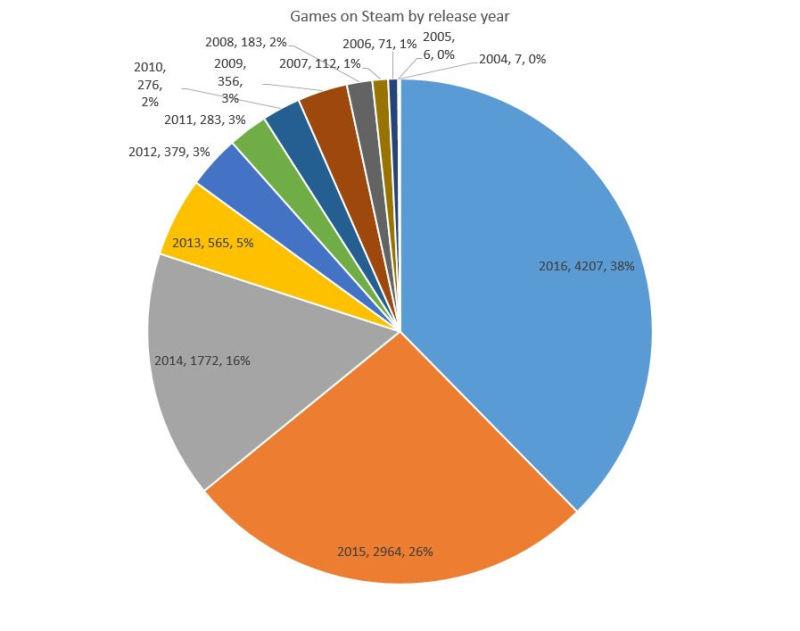
The video game developer and distribution platform-owner Valve has announced that it will no longer moderate game submissions to Steam, and will instead "allow everything", so long as it is not blatantly illegal or "straight up trolling". This comes after literal years of complaints from players about the poor quality of games being submitted on the platform, and years of failed attempts by Valve to shut down or limit such releases. Apparently, they are just giving up.
Valve executive Erik Johnson made this announcement on an official blog post today, in which he defended the change in policy as a matter of protecting free speech rights.
"If you’re a developer of offensive games, this isn’t us siding with you against all the people you’re offending. There will be people throughout the Steam community who hate your games, and hope you fail to find an audience, and there will be people here at Valve who feel exactly the same way. However, offending someone shouldn’t take away your game’s voice. We believe you should be able to express yourself like everyone else, and to find others who want to play your game. But that’s it."
-- Erik Johnson, Valve executive, official blog
I'm a huge proponent of free speech, and a firm opponent of censorship, but I'm not sure if this move from Valve is the right one. For me, this is less an issue of free speech and censorship, and more an issue of quality control. Steam is already inundated with crappy, barely-working games that are phishing for people's money. People have been submitting, and charging consumers for, blatant asset-flips, Unity tutorials, copy-pasted rip-offs and clones, achievement farms, and all sorts of other low-quality, minimum-effort games and "fake games". In essence, Valve is enabling illigitimate developers to sell defective merchandise to the public, and Valve is directly profiting off of those sales. Does this represent a conflict of interest? Is Valve under a perverse incentive to facilitate the sale of as much crap as it possibly can?
That doesn't even include larger indie debacles like Life of Black Tiger, which actually saw a release on PSN as well! It also doesn't include the vast array of Early Access titles that may or may not at some point be released as "complete", fully-functional titles.
Yes, it is nice that indie developers (especially budding young ones) have a platform on which to publish their work. However, the flood of games on the platform is not necessarily good for the consumer. Even if all the games that were submitted to Steam were quality games submitted by honest developers in good faith, the shear volume of games would already make it difficult to weed through to find what you are looking for.

Almost half of all games ever released on Steam were released in a single year.
Source: Steam Spy.
Instead of doing their own moderation or quality-control, Valve apparently intends to release a suite of controls intended to allow end users to filter out content that they don't want to see... [More]
397aecb2-8914-4766-aae9-7a6fe2b8fd6b|1|5.0
Tags:Steam, Valve, censorship, free speech, indie gaming, PC, Poe's Law, toxic fandom, political correctness, Abstractism, cryptocurrency, malware

If there was one thing that was going to completely derail this movie for me, it was going to be its tone. The cockpit furby in the trailer was completely off-putting for me, and the actual movie begins with a dumb joke that makes one of the movie's key villains look like a complete dolt. Maybe that's the point, but the joke fell completely flat, pulled me out of the movie, and the movie had to do a lot of work from then on in order to pull me back in.
Fortunately, it eventually did pull me back in and held me throughout. I was totally on-board with the direction Rian Johnson took Luke Skywalker, and the parts of the movie that take place on the island were the definite highlights for me. Tone was still an issue though. There's a lot of attempts at humor that fall flat on their face. About the only jokes that worked for me were Luke tickling Rey's hand with the leaf and Luke chucking the lightsaber over his shoulder (apparently in the same place he chucked his X-Wing and all his other unwanted garbage).
Obviously, this movie takes a lot of its thematic and tone queues from The Empire Strikes Back. It's the middle movie in a trilogy that's [assumedly] not going to end with the main character murdering all the other good guys in cold blood and turning into a bad guy, so it has to be dark and brooding. The juvenile humor (along with the cartoonish action) just completely doesn't work in a movie that takes itself as seriously as this one does.
Those bad jokes and occasional cartoonish action sequences are surrounded by a movie that actually does have a lot of meta-thematic weight to it and tries very hard to push the Star Wars universe in a new and interesting direction. This isn't the fan service vehicle that The Force Awakens and Rogue One were. This is an actual movie with something to actually say about movies and fan communities. It doesn't hit quite as hard as Black Mirror's recent evisceration of fan entitlement via a Star Trek parody, but it comes close. As much as The Force Awakens delighted audiences with its whole-hearted embrace of nostalgia and fan service, The Last Jedi works very hard to actively disappoint fans. As the trailers promise, "this does not end the way you think", and from here on out, it's SPOILER TIME:
The Last Jedi goes out of its way to disappoint, regardless of what fan theory(ies) you subscribed to. [More]
66ac085b-1075-478b-a2d3-1af81be7e711|0|.0
Tags:Star Wars, The Last Jedi, Star Wars: The Last Jedi, Lucasfilm, Disney, Rian Johnson, Rey, Kylo Ren, Supreme Leader Snoke, Leia Organa, Carrie Fischer, Luke Skywalker, Chewbacca, Han Solo, hyperdrive, Black Mirror, toxic fandom
Netflix's extraordinary exclusive series Black Mirror recently released its fourth season, and it's premiere episode, "USS Callister", is already being praised around the internet for its spectacular deconstruction of toxic fandom and male-entitlement power fantasies. It deserves every bit of that praise. Jesse Plemons is also deservedly earning plenty of praise for his incredible performance as both a nerdy creeper and for his spot-on Shatner send-up. But Black Mirror, as a series, is so good, in part, because it works on many, many different levels. So I wanted to spend a bit of time praising the episode for some of its other concepts that are getting less attention in the mainstream.
Jesse Plemons puts on a masterful performance as a nerdy office creeper and a spot-on Shatner send-up.
Before I do that, I want to start by saying that I love Black Mirror as a series. It's a modern-day Twilight Zone with a specific focus on the social impacts of technology, and dire warnings about their dangers. Yes, it's pessimistic, but it's bloody brilliant! I haven't sat down to watch every episode yet, and have only seen a handful of episodes from the first three seasons and the season four premiere. That being said, the show's second episode "Fifteen Million Merits" is one of my favorite pieces of television ever. "The Entire History of You", "Be Right Back", and "San Junipero" are also some of my favorites so far.
These episodes (along with "USS Callister") work so well for me because they do such a fantastic job of world-building -- at least, when they are not unrealistically pretending that memories and personality can be replicated from DNA, which is a major (almost story-breaking) stumbling block for Callister. These deep, nuanced worlds create many levels of commentary to unpack. "Fifteen Million Merits" focused on reality TV and pervasive advertising, but it also has some scathing warnings about a culture of body-shaming, obsession over digital merits (read: XBox Live and Steam Achievements), and how corporate avarice could turn a post-scarcity economy into an absolute dystopia.
A friend of mine highly recommended "San Junipero" to me on the grounds that it's a more optimistic episode than many of the others -- even having a happy ending. But my takeaway was not a "happy ending" at all. The fairy tale ending hides a sinister metaphysical question that the text of the episode mostly sidesteps: the mind-body problem. Is the avatar of a deceased person living in San Junipero really that same person? Or merely a copy? Are they one power failure away from being snuffed out of existence? Are people committing suicide based on misinformation from a multi-billion dollar corporation promising that they can live forever in a simulated reality?
Black Mirror's exceptionally well-thought-out worlds always leave sinister nuances to unpack.
"USS Callister", on the surface, appears to be entirely about toxic fandom (along with male entitlement). It is absolutely about that, and it does a fantastic job of presenting it. As a Star Trek fan, I also enjoyed the deconstructive elements about Trek tropes and the unrealistic reverence that fans hold for the series and its established canon. As someone who blogs about Star Trek, Star Wars, video games, and other fanboy topics, I am certainly a target of at least some of this episode's criticism.
As someone who works in the software industry, I recognized the episode also taking swipes at the cult of personality attached to tech moguls like Mark Zuckerberg, Jeff Bezos, Elon Musk, Bill Gates, Steve Jobs, Gabe Newell, and others, and the idea that they may be taking credit and profiting on other people's work, and becoming filthy stinking rich at the expense of the consumers who mindlessly use and venerate their products, all with willful disregard for how those products may be misused. As someone who can't wait to put myself on the waiting list for a Tesla self-driving car, I'm also well within the cross-hairs of that line of commentary... [More]
75a819a5-da6e-4b26-8c2f-fe641b289a76|0|.0
Tags:Black Mirror, Netflix, streaming television, Jesse Plemons, science fiction, anthology, USS Callister, Star Trek, the Twilight Zone, Westworld, technology, artificial intelligence, video game, mind-body problem, ethics, toxic fandom, toxic masculinity, male entitlement, cult of personality, sexism, gender
|

| 12 | | | | | | | 60 | | 11 | | | | | | | 55 | | 10 | | | | | | | 50 | | 09 | | | | | | | 45 | | 08 | | | | | | | 40 | | 07 | | | | | | | 35 | | 06 | | | | | | | 30 | | 05 | | | | | | | 25 | | 04 | | | | | | | 20 | | 03 | | | | | | | 15 | | 02 | | | | | | | 10 | | 01 | | | | | | | 05 |
|